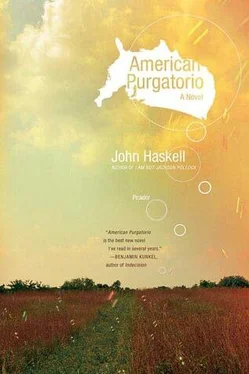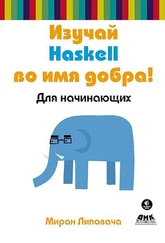John Haskell - American Purgatorio
Здесь есть возможность читать онлайн «John Haskell - American Purgatorio» весь текст электронной книги совершенно бесплатно (целиком полную версию без сокращений). В некоторых случаях можно слушать аудио, скачать через торрент в формате fb2 и присутствует краткое содержание. Год выпуска: 2006, Издательство: Picador, Жанр: Современная проза, на английском языке. Описание произведения, (предисловие) а так же отзывы посетителей доступны на портале библиотеки ЛибКат.
- Название:American Purgatorio
- Автор:
- Издательство:Picador
- Жанр:
- Год:2006
- ISBN:нет данных
- Рейтинг книги:3 / 5. Голосов: 1
-
Избранное:Добавить в избранное
- Отзывы:
-
Ваша оценка:
- 60
- 1
- 2
- 3
- 4
- 5
American Purgatorio: краткое содержание, описание и аннотация
Предлагаем к чтению аннотацию, описание, краткое содержание или предисловие (зависит от того, что написал сам автор книги «American Purgatorio»). Если вы не нашли необходимую информацию о книге — напишите в комментариях, мы постараемся отыскать её.
Los Angeles Times
American Purgatorio — читать онлайн бесплатно полную книгу (весь текст) целиком
Ниже представлен текст книги, разбитый по страницам. Система сохранения места последней прочитанной страницы, позволяет с удобством читать онлайн бесплатно книгу «American Purgatorio», без необходимости каждый раз заново искать на чём Вы остановились. Поставьте закладку, и сможете в любой момент перейти на страницу, на которой закончили чтение.
Интервал:
Закладка:
The sky, which had been becoming dark, now was dark, and there I was, on the side of the road, and just about when I was thinking of spending the night where I was a car drove by. I flagged it down and the man who was driving came over and looked at the Pulsar. He had a flashlight and he shined it at an area to the side of the engine block. He said it was the timing belt, or timing chain — he said it was known by both — and that it wasn’t turning. This was serious, he said.
And as this man, a photographer, was pronouncing the car in big trouble, a truck drove up with men in the back, Hopi men, who lived near there and worked for the park and were going home. They looked at the car too, and they agreed that the timing chain was a serious problem. If it was the problem. The photographer reminded me that you never knew how bad it was until the engine was taken apart. They all helped push the car back onto a small dirt road, and since it was night by now and where to go was an issue, Gilbert, the Hopi man driving the truck, told me I’d better come with him.
When he said this, and when he had earlier agreed to the timing chain theory, he didn’t use many words. He said what he had to say and then he was quiet. The photographer drove off and I got in the back of the truck with three other Indian men, all wearing cowboy boots, and during the drive I didn’t talk. Once I asked one of the men if it was dangerous in the desert at night, but all the man did was nod. We drove on an old rutty road for about twenty minutes, the men in the back getting off at various roads in the dirt until at the end it was just Gilbert and me when we pulled into a kind of compound.
There were several dogs barking and some children near the house. It was a small house and modern, or fairly modern, built in a conventional way. Not far off was another building, a six-sided hogan with a sod roof. Gilbert went into the regular house and I started to follow. First I looked up into the night sky, which was black except for the stars, and then I followed Gilbert inside.
A woman was doing something at a stove and an older woman was sitting on a rocking chair. The older one was wearing a deep green shirt and a long full ruffled skirt. No one said anything to anyone as far as I could tell. Gilbert sat at a square table and I also sat and still no one spoke.
Gilbert nodded when I thanked him for the ride. I asked some question about sheep and whether he had any sheep and he pointed in a general direction with his hand. I nodded. I had so much to tell them, to share with them in words, but I could see that words were not the medium here, and in living without the gluttony of words, they were taking the burden off the descriptions of things and letting the things themselves be what they were. Although these people weren’t speaking, I imagined that when they did, their words would be a little purer and a little more meaningful.
I assumed that not speaking was a normal mode of relating and so I stopped trying to speak, stopped trying to think of something to say, and instead just sat. The fact that everyone else was doing the same thing made it easier. We all sat for quite a while and it didn’t take too long before it felt normal, and even comfortable.
The woman was making food, and food, I thought — that would be a good way to bond with this family. I was starting to feel at home in this strange abode. And happy. And because I wanted that feeling to last (into the future), I began wondering where I was going to sleep, thinking I should have brought my sleeping bag because I didn’t see any extra beds, and as my mind raced ahead, I was looking forward to sleeping in the traditional Navajo dwelling. Or Hopi dwelling, I didn’t know.
Either way, it was a memorable experience, one I would savor and cherish, and as I was thinking about what a fine experience it was and how happy the experience was making me, a car drove up outside. Gilbert went to the door and there, standing at the door, was a white man, a ranger. He’d seen the Pulsar, he said, and now he was here to take me back — something about the native domiciles being off-limits, or private property, or National Park regulations. My car, however, was a unique situation, and so he’d make an exception and let me spend the night in my car. I nodded at Gilbert, who nodded back, and I got in the truck with the ranger. He dropped me off, took down my information, said he’d check back in the morning and that I could make the necessary arrangements then to have my car towed out of the park.
The stars were out and then the clouds came in and I stood outside, leaning against the car. I drank from a bottle of water, ate cashews, unrolled my sleeping bag in the back seat, and although I tried to sleep, I was awake the whole night. My mind was filled with thought after thought, starting with the car. Why hadn’t I fixed the car before it was ruined? Why had I been such a cheapskate? And it wasn’t the car; it was my life. The dream I’d had for my life was getting smaller and smaller, shrinking and cracking, and at a certain point tears actually came to my eyes. I was crying for that dream, or the loss of that dream. I felt an actual physical pain, a heaviness in my body. And once I felt it, once the reality of the deadness of my dream started festering in me, sleep was impossible.
5
I mentioned that I was an editor in New York, at a baby magazine. But I wasn’t always an editor. Growing up in Chicago I had, I don’t know what to call it, a dream, I guess. I wanted to be a playwright. I felt I needed an identity, as a person. I needed something I could be, some thing, and I thought a playwright, that was something I could be, I could live with that. If I was a playwright I could be happy, I thought, so I got together with some people and started a theater company. I did all the things I thought a playwright would do. I got an odd job. I wrote a play. I wrote this play and the play got a production and I thought, Okay, this is it, I will be the thing I want to be. This will make me what I want to be, I thought, and the theater mounted the play and the play was a failure, critically and artistically. I could see that. But I thought, No, you learn from your mistakes. Yes, you do, you learn, and I did, I learned from my mistakes and I knew, I knew what to do the next time. I wrote another play, and this play was much more original. It was something no one had ever seen before, and it was going to blow the walls away. I directed it, with a pornographic movie projected on a screen behind the actors, and I thought it would be good, really good, and I was excited about it. But the play was a failure. A different kind of failure, but a failure nonetheless. But no, I thought, you learn from your mistakes, yes, yes you do, and not only that but those obstacles make you stronger. A great playwright isn’t just born, you have to struggle and overcome the obstacles and be stronger, and I was, I was getting better. I knew what I’d been doing wrong. So I wrote another play, and I thought this play would be good, and it was, it was really good, it was from a true-life experience and it really was good and this play won a prize. So the confidence I had in myself was confirmed, by an outside source, and yes, I thought, I’m on my way to being the thing I want to be. I’ll be happy now. And that’s great, and the play won another prize. I was flown to New York and I thought, Okay, here we go, and I felt as if the world … here it is, and I went to New York and the New York producers looked at it and it wasn’t quite right for them, they said. But that was okay because a theater was planning a Chicago production, and I thought, That’s good, that’s better, start small, start small and then just go forward, conquer the world, and the theater put on the show and no one came and the show lost a lot of money. The theater company went bankrupt, and I didn’t know what to do. I began to think, Something is not right here, obviously, and I took some time off and I discovered what it was, what it was I wasn’t doing. I wasn’t being myself. I was trying to do something else, and that’s it, I thought, I will write a play that is who I am, about people and the things between people, and the society, and the structure of that society. And I wrote this play that I thought was good, brilliant even, and it had a reading and it was terrible. It was. I was cringing at my own words. And so I didn’t know. I just didn’t know. And I began to think that maybe the dream was not the right dream. Maybe I had the wrong dream. But I didn’t want to say that, I didn’t want to admit defeat. I was strong. I could persevere. And I was walking along, in New York, on Wooster Street, it was Wooster Street because the sidewalk was bumpy and I had to keep my eyes down so as not to trip, and I was walking along, and all of a sudden I felt it snap. It snapped. The dream. The dream died. And I let it die. It didn’t feel that bad. In fact it felt good. It felt like what it must feel like, or what I imagined it must feel like, when a dream comes true.
Читать дальшеИнтервал:
Закладка:
Похожие книги на «American Purgatorio»
Представляем Вашему вниманию похожие книги на «American Purgatorio» списком для выбора. Мы отобрали схожую по названию и смыслу литературу в надежде предоставить читателям больше вариантов отыскать новые, интересные, ещё непрочитанные произведения.
Обсуждение, отзывы о книге «American Purgatorio» и просто собственные мнения читателей. Оставьте ваши комментарии, напишите, что Вы думаете о произведении, его смысле или главных героях. Укажите что конкретно понравилось, а что нет, и почему Вы так считаете.











